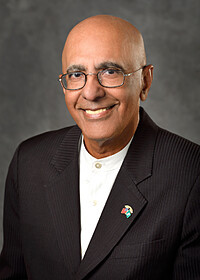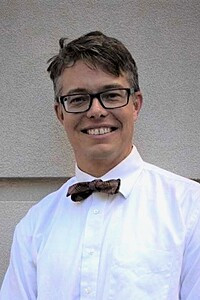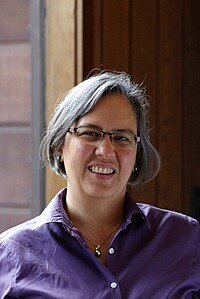Bioplastics are receiving much attention as a way to reduce carbon footprints and to address the serious problem of plastic waste polluting our oceans and land. The term bioplastic describes two separate classes of polymer materials: bio-based plastics, which are characterized by the carbon feedstock used to make the plastic, and biodegradable/compostable plastics, which are characterized by the plastics’ behavior at end-of-life. Unfortunately, there is much confusion in this space and many misleading claims abound in the marketplace.
Dr. Ramani Narayan, University Distinguished Professor, Michigan State University College of Engineering, discussed what these terms mean, the environmental and greenwashing claims surrounding them, and the advantages and disadvantages of bioplastics in terms of impacts to human health and the environment. Dr. Marty Mulvihill, Co-founder and Managing Partner, Safer Made and Researcher and Advisor, Berkeley Center for Green Chemistry, highlighted current applications of bioplastics, drawing examples from apparel and food packaging. He also discussed the opportunity for finding new functional additives as well as the next generation of bio-polymers. Dr. Ann Blake, Founder and Principal, Environmental & Public Health Consulting, described the current landscape of the bioplastics industry, including responses to drivers such as increasing public concern around plastic pollution from single-use plastics. She also discussed our opportunity to create criteria across the life cycle of bioplastics to ensure their health and environmental impacts do not recreate the problems of fossil-fuel-based materials.
Featured Speakers
 Ramani Narayan, PhD, is University Distinguished Professor at Michigan State University -- the highest honor that MSU bestows on a faculty member. He is an elected Fellow of the U.S. National Academy of Inventors; Fellow, ASTM; and recipient of the ASTM Award of Merit -- the highest award given by the society to an individual member. He has been awarded the Governor’s (State of Michigan) University Award for commercialization excellence; Michigan Green Chemistry Governor’s Award for developing biodegradable packaging and insulation foams; Fulbright Distinguished Lectureship Chair in Science & Technology Management & Commercialization at University of Lisbon, Portugal; DuPont’s Packaging Award for Excellence in Innovation & Sustainability; and many others.
Ramani Narayan, PhD, is University Distinguished Professor at Michigan State University -- the highest honor that MSU bestows on a faculty member. He is an elected Fellow of the U.S. National Academy of Inventors; Fellow, ASTM; and recipient of the ASTM Award of Merit -- the highest award given by the society to an individual member. He has been awarded the Governor’s (State of Michigan) University Award for commercialization excellence; Michigan Green Chemistry Governor’s Award for developing biodegradable packaging and insulation foams; Fulbright Distinguished Lectureship Chair in Science & Technology Management & Commercialization at University of Lisbon, Portugal; DuPont’s Packaging Award for Excellence in Innovation & Sustainability; and many others.
Professor Narayan is Scientific Chair of the Biodegradable Products Institute (BPI) USA and convener/technical expert on ISO (International Standards Organization) committees. He is technical advisor to many organizations and groups in the bioplastics space – Plant Based Products Council (PBPC); WWF-led Bioplastics Feedstock Alliance; USDA Biopreferred program; and Coca-Cola Company Plant Bottle Advisory Board. He serves on the Board of Directors of a NASDAQ company, Northern Technologies (NASDAQ:NTIC).
He has 200+ refereed publications, 30 issued patents, and graduated 20 PhD and 25 Master’s students. He is a successful entrepreneur, having commercialized several bioplastics technologies.
 Marty Mulvihill, PhD, is the co-founder and a managing partner in Safer Made, a mission-driven venture capital fund investing in companies and technologies that reduce human exposure to harmful chemicals. Marty is also a researcher and advisor at the Berkeley Center for Green Chemistry, which he helped create and where he served as the initial Executive Director from 2010-2015.
Marty Mulvihill, PhD, is the co-founder and a managing partner in Safer Made, a mission-driven venture capital fund investing in companies and technologies that reduce human exposure to harmful chemicals. Marty is also a researcher and advisor at the Berkeley Center for Green Chemistry, which he helped create and where he served as the initial Executive Director from 2010-2015.
Marty Mulvihill received his PhD in 2009 from the University of California, Berkeley in Chemistry and Nanoscience. Marty’s research and work have focused on developing technologies that help provide access to clean drinking water and the creation of safer chemicals and materials based on biological feedstocks. He has a number of publications and patents related to the detection of arsenic in drinking water, and he has developed safer chemicals and materials for the personal care, construction, electronics, and textile industries.
 Ann Blake, PhD, is an independent consultant with over 25 years of experience finding safer alternatives to industrial chemicals and materials in global manufacturing. Her work has included creating criteria for environmentally preferable purchasing, ecolabels and product rating systems as well as local, national and international chemicals policy reform. Clients include the Garfield Foundation’s Cancer-Free Economy Network, and the City of San Francisco’s Department of Environment. In 2018, Dr. Blake worked with the Berkeley Center for Green Chemistry advising Costco Wholesale, the second largest global retailer, on their chemicals management. Past clients have included the Blue-Green Alliance, a US national strategic partnership between labor unions and environmental organizations, and IPEN (the International POPS Elimination Network), a global network of public interest NGOs.
Ann Blake, PhD, is an independent consultant with over 25 years of experience finding safer alternatives to industrial chemicals and materials in global manufacturing. Her work has included creating criteria for environmentally preferable purchasing, ecolabels and product rating systems as well as local, national and international chemicals policy reform. Clients include the Garfield Foundation’s Cancer-Free Economy Network, and the City of San Francisco’s Department of Environment. In 2018, Dr. Blake worked with the Berkeley Center for Green Chemistry advising Costco Wholesale, the second largest global retailer, on their chemicals management. Past clients have included the Blue-Green Alliance, a US national strategic partnership between labor unions and environmental organizations, and IPEN (the International POPS Elimination Network), a global network of public interest NGOs.
Dr. Blake is a member of the Green Ribbon Science Panel created by the California legislature to advise California EPA on the implementation of California’s Safer Consumer Product regulations. Dr. Blake has created curriculum on green chemistry and alternatives assessment for the University of California Berkeley Extension Program and for the University of Washington Department of Environmental and Occupational Health Sciences. She is a co-author of the BizNGO 2014 Plastics Scorecard, and of Perennial Industrial Crops: Green Chemistry and Carbon Sequestration, in the 2019 Springer Handbook of Ecomaterials. Prior to consulting, Dr. Blake worked for the California Environmental Protection Agency's Department of Toxic Substances Control as a hazardous waste inspector and Pollution Prevention Coordinator. Dr. Blake has a BA from Mount Holyoke College in Massachusetts, and a PhD in molecular genetics and neural development from the University of Oregon.
This webinar was moderated by Karen Wang, Director of CHE.
It lasted for 80 minutes and was recorded for our call and webinar archive.
